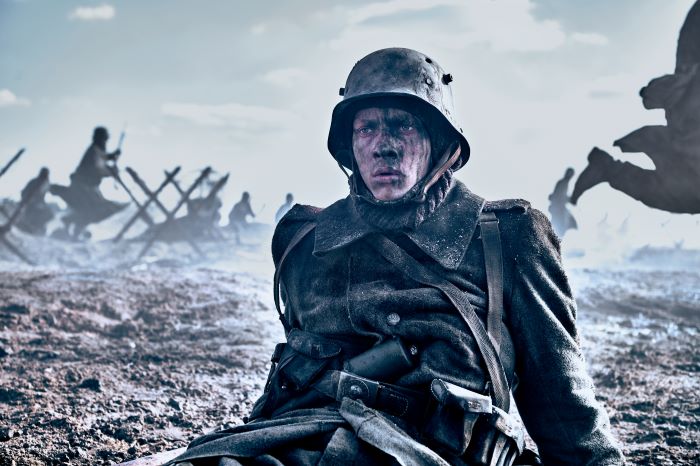Lewis Milestone’s 1930 adaptation of All Quiet on the Western Front, based on Erich Maria Remarque’s 1929 novel, was the third film to win an Academy Award for Best Picture. Today it comes across as broad in its depiction of a group of patriotic German soldiers, desperately eager to serve their country, who are in turn brutally disillusioned by their experience on the battlefield. That being said, the early sound film has surprising strengths. The battle sequences are astonishing, especially given when it was made, and convey a sense of horror not far from Saving Private Ryan. A single soldier, holding his eye and screaming that he has gone blind, is just one of the brutal moments that still has incredible power, and to Milestone’s credit, the anti-war movie was banned not only in Nazi Germany, but all over the world.
That was my opinion before I watched the new adaptation by Edward Berger. Now, I have to say I like the original movie much more. This is not to say there is nothing successful in Berger’s version. It is, in fact, bold and intriguing in the steps it takes, and the filmmakers do not simply try to retell the narrative with today’s special effects. Still, it lacks much of what gives the story its appeal.
It begins in the forest, among looming trees, which the camera approaches from a striking bird’s-eye view, only to zoom in much closer to a family of foxes. Peaceful, bucolic images are quickly shattered by an overhead shot of dead soldiers lying scattering in a misty forest, before the eruption of more carnage, a battle in which no punches are pulled. No effect, whether it is an explosion of a bomb or a spurt of blood, is left unused, and the sequence ends with soldiers breaking off and collecting the name tags of their dead brethren. These dog tags are then sorted through so that their families can be contacted, while their uniforms are restitched by a warehouse full of seamstresses for the next batch of eager soldiers. Before we have even met the principal characters, Berger wants the brutality of war to hit the audience full in the face. We will be disillusioned long before the new batch of recruits face the fighting.
Berger has excellent actors, and Felix Kammerer is wonderful as the protagonist, Paul. An early scene in which he and his comrades giddily try on their uniforms and gas masks contains exactly the kind of camaraderie that feels so general in Milestone’s version, as does another scene in which Paul reads to an illiterate comrade a letter from the latter’s loved one as they sit on the can. Yet moments like this, not to mention the characters themselves, are not given enough space.
There are two major changes that distinguish Berger’s version from the original. The first is that Berger’s battles take up much more screentime. They are longer, bloodier, and seem dedicated to making the most of the resources filmmakers have now that Milestone did not, and also to hammering home the ugliness of war. This is, in some ways, an odd choice, since, as noted earlier, the 1930 film did a fine job conveying this. However, Berger has a fine eye for detail (a teacup shaking in a moving car, rats scuttling out from hiding as tanks approach), but to say his battle scenes, while admirably unflinching, are gratuitous is not quite correct. It’s more that they are oddly unaffecting.
The other is an interpolated sequence, absent from both Milestone’s film and the novel, which involves armistice negotiations between the Germans and the French, as well as one especially conservative military officer, who claims that the politicians are ruining Germany. The intention here is clear: We have a perspective neither Milestone nor Remarque had in that we know what will come next: fascism. It’s an intriguing idea. Ultimately, it detracts.
Both additions serve to suck energy away from the most important part of the story: the young soldiers, their naïve excitement for war, and their heartbreaking loss of illusions. This was something the original film, despite its pamphlet-like broadness, never lost sight of. Even more so than his discovery of war’s ugliness, one of Paul’s crucial realizations is that he has been manipulated by his country’s patriotic rhetoric. This idea is scarcely present in Berger’s version, and the loss is significant.







Leave A Comment